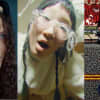Right around the time that James Ferraro released his latest album, Far Side Virtual, we met up in Union Square to talk about the record. That conversation turned into a thing about technology and comfort and copies of copies of copies. Essentially, it is the world as seen through the eyes of James Ferraro. To be entirely honest, I'm still not sure how I feel about Far Side Virtual, but the ultimate takeaway is that it's a bizarre, complicated and trickily difficult album. Last night, Ferraro released BEBE T U N E S - I H A L E C - 4 $$$$$ (his spaces, not ours). It's essentially Ferraro's take on what he hears on the radio. It sounds both exactly and nothing at all like what is actually going on there. Far Side Virtual is out now on Hippos in Tanks, is available for free right here. Read the interview below.
Originally you picked Max Brenner: Chocolate by the Bald Man as the place you wanted to meet. Instead we’re at a Cosi. Does it serve the same purpose? To me almost every restaurant or any chain has this weird global vibe. All the decoration all the food…this kind of weird mixture of seemingly unrelated objects.
It seems like they’re designed to have as little character as possible. It’s strange. It’s this very ambiguous mixture of almost every culture in the world.
You grew up in New York, right? Yeah. I also have mad family in Rochester, upstate New York. I was there a lot, and definitely spent time in the weird suburban utopia zone. I find it really strange because a lot of people will listen to Far Side Virtual and be like, Oh this is so LA, and I’m like, Actually man, it’s super New York. I was just walking around St. Marks earlier—that whole area, the lower east side, it’s pretty amazing. It’s pretty out there. It’s interesting to see how the city can change?
Do you feel like it has changed from when you were growing up? Not really. Kind of. It has the same energy I think. It’s like the next generation adopts it, and then they have their own version of it. Even Melrose Place in California, its super surf bohemian arty zone is still there, but it’s 21st-century style. A little more slick and glossy.
St. Marks used to be pretty shady and gross, and it still is, but now it feels like the people that hang out there go there because they know it’s a gross destination. It’s like an imitation of what it was, but you go there for what it was now. It’s a copy of a copy, yeah. I think a lot of people flock to destinations all over the world based on things they learned from movies or books. It’s like how Nubia took over Egypt and they fully embraced their whole culture and it became this second-wave Egyptian civilization.
Now you live in LA. Why’d you decide to move there? I visited there many times, and actually my dad moved to San Diego. There’s a way of life in Southern California specifically—I mean, everything that’s in the record is happening there in complete real time, there’s still real over-exaggeration. But it’s also—we were talking about St. Marks—it’s just totally a hyper-real place.
With your last record, Nightdolls With Hairspray, you made your own version of a pretty straightforward rock album. I remember reading that you were going to do more records like that, but Far Side Virtual is completely different. Did you abandon that idea because you moved to LA? It’s definitely likely to pop back up later. I really relate to impressionism, so I feel like a lot of my records have always been straight up impressions of things I’ve experienced. Before Last American Hero, I mean. I was visiting my grandparents in Florida, and they’re just so trapped in their stucco, dated, table-ready utopia, you know? And that sort of birthed [Last American Hero]. Night Dolls was different because it was actually, in a lot of ways, a fiction that I was creating. They’re all sort of like that, but this one was definitely a sort of Less Than Zero zone of heavy MTV generation burn out TV clones. The idea is a basic working premise that I had for [Far Side Virtual]. It actually wasn’t this huge conscious shift in fidelity or change in style, but this particular record and what it was about yielded that because it was based off modern phenomenon, and that really filtered into my own style.
Your records are all very concept heavy. Do you often come up with the concept before writing the songs? Oh yeah. Far Side Virtual has been an album concept floating in my head for the last five years. I finally just did it.
Have you ever recorded anything without a concept in mind? Yeah. A lot of my more unofficial CD-R releases are definitely more like jams assembled into a certain context.
Now that you’re getting more attention, is it weird to have so much material out there? I feel like people are starting to come back to those CD-Rs and maybe that wasn’t your intention. I find them relevant to my entire body of work, but to be honest, certain things just weren’t considered. I mean, this is like 2006, 2007, 2008 and things are just a bit different…a bit underground. It wasn’t really presented as, Here’s my official studio record,” it was more just cranking out material…just creating things. It was mainly based on touring or a smaller online mail-order distribution. I think if people can return back to certain releases, I’m really excited about that. Some are a little less important in my eyes, but they’re interesting in their own way. Some things aren’t necessarily in conversation with things I’m doing now.
The way you record is very much about forward movement. Like, here’s a concept and you’ve examined it and now you’re onto the next one, so I was surprised to see some of your work getting reissued. It’s sort of strange sometimes when you find the two things, the newer product and the older one, having to compete. There is limited space with the way people consume material, like online or in record stores. That aspect is interesting. As far as people wanting [reissue my work], I’m fine with it, but I think I would like, from now into the future, to sort of hold off on that kind of stuff. Certain releases I’m fine with being unearthed and reissued and given to my newer audience, but they’re the ones that are in conversation with things now.
When I heard about you, before I’d heard any of your music, it was because a lot of artists were telling me they were influenced by you. I assumed you were some old dude that I just didn’t know about. Do you feel like you’re an influence on your peers? No. I mean, I think that certain things perhaps people have picked up on and done, but in all honesty, I feel like I was just doing what I was doing, and I’ve had a lot friends making music…I think I was influenced by others. It’s such a hard question to answer because I don’t really look at it in that way. I think it just becomes part of the language of music and those things become infused in other people’s work, and it becomes the language people adopt. It’s hard to really pinpoint where these things actually originated from. I think my music is a product of that as well as the stuff that came before me.
It seems like for the first time in…maybe ever, it’s okay for a band to sound like another band that came before it. It used to be the ultimate offense, but it’s tipping positive. I think that in the past there are very obvious changes in music and that’s always been parallel to the technology that was being created at the time. I feel like the way our technology is growing…it’s becoming more augmented and, in a way, it’s not as baroque and it’s not as harsh as older technology in contrast to humanity. I feel like there’s this impressionism that’s happening and through digital recording there’s this clarity that’s being created. I think sonically these things ultimately sound different because they’re recorded digitally. I think the difference is more subtle. The changes in music these days are more subtle and they’re not as crazy, you know what I mean? Like [in the past] a certain drum machine changed the entire landscape of music, whereas what’s happening now is fidelity is changing and clarity is becoming more important. I’ve definitely found inspiration from older stuff, most specifically, Night Dolls and Hairspray is super B-movie, really strange, demented ’80s-’90s cable mania. In a sense, that is retrocentric in its own right, but there is this filter that is working there. I would never start a rock band and try to jam Van Halen covers. There’s a more hyperized zone happening, kinda post-Ariel Pink, post-everything where bands are just…being Van Halen.
Do you think you make weird music? On a surface level, I think some of the things are definitely weird. But my approach is more painterly. I find the material to be weird or striking, but the concepts are pretty basic. If someone could latch onto that, then they can stand listening to the entire record, which has much more hard-to-listen-to stuff. They’ll understand it as a very accessible work of art because the concepts are there and the music is a very real part of it. But the concept, to me, is 50% of the record. Expressionism, which I love, is very important. If you have something conceptual that people can bite into, then they could understand the more obscure parts of your work and they can pause and be like, Oh I understand what he’s doing. It’s not my thing, I’m not going to listen to this on my iPod or whatever, but I understand this as a work of art. That’s how I’ve considered it for a long time, and each record to me was really this sonic abstract expressionism, like the CD being a canvas for this audio art. I still do, I really still do. The physicality of that, I’m still very interested in. But I am considering certain things…cause I want some of the ideas to be more accessible, to break through the underground. I find that very meaningful.
So it’s pop music from a very considered angle? It’s kind of a balancing act. Ultimately, it’s for other people to decide. Whatever they want to take from the record is cool. People still consume objects for a specific reason even when that object is multifaceted. One person might consider it more artful and someone [else] is just going to be into the music aspect of it.
Was this record influenced by early-’90s computer software? There is a distinct comfort inherent to that stuff if you’re of a certain age. People have actually said that. A lot of people have been like, Yo this is super ’90s CD-ROM, and that’s fine for people to understand it in that way. I was really inspired by current Google commercials and Virgin Mobile commercials and T-Mobile and ringtones and things that are happening in my environment now. It’s a surprise that people are relating it to that era, which is funny because if you listen to that music you see that not a lot has really changed. They sort of figured out the formula back then, it has become a little more modern, a little more slick.
It certainly doesn’t feel like a difficult record. It sounds comforting to me. I think the comforting sound comes from the fact that there is this sort of comfort or hope or something embedded in all these ring tones. It’s total sonic psychological behavior control. You get a text and the tone is very happy and optimistic. The infrastructure of that stuff is promoting this utopia—promising this world of hope. I think that when I was working with that and drawing inspiration from ringtones, the album came across as that because it was embedded in what I was mirroring.
The flip side of that is the paranoia that people are feeling as technology advances. I think anyone in the world is aware of that fear and paranoia. Some people decide to vocalize it and some people don’t. You might be a social outcast or a deviant if you don’t own a cell phone…an iPhone, specifically. It’s like, if you’re not on the grid, you might be this shadowy figure that is a weirdo. That makes sense, I think it’s ultimately like that because you’re not getting the same stream of information as everyone. I can see people being afraid of that. Is it this sort of mandatory thing?
I don’t think it’s mandatory, but by not participating you’re automatically casting yourself out. You seem to embrace this stuff, though. I’m very much in awe of it all. It’s hard for me to have a really solid opinion about anything really, especially in regards to stuff like this because it’s always changing. It’s so multifaceted that it’s hard for me to stand behind one idea.
So is Far Side Virtual your record about the way technology is? The idea was for it to be a still life. I really just wanted it to be an impression of the world, generating colors in my own mind. There’s no real criticism that’s embedded, because if people want to critique society, they will. If I’m successful in making a still life, then they can pull what they want from it. Everything is pretty augmented. I go on these hikes in LA, these really insane trails of like…the Hollywood outback, essentially. There will be all these modern hikers with augmented pulse monitors, and every conversation that you pass by, someone’s talking about the internet.
The album is out on vinyl, but that doesn’t seem like the way it’s meant to be heard, necessarily. The record sounds the best to me coming from iPhone speakers. That’s how I wanted it. That’s the most important thing, it’s meant to be consumed through these devices: laptops, headphones and cell phones. The titles of the songs are meant to be in ringtone form, like, you know how when you buy a ringtone it has a name? Some of them are deep, like…"Valley Girl," "Paradise," whatever. The synchronicity of these things creates this weird haiku, this picture of society. That’s what I was thinking of.
Do you make music entirely based on the world around you, or does it come from somewhere more internal? I’m very interested in the world. I love being creative, and I love hearing about the world so it just kind of comes out. There’s a sociological element to a lot of my music, and some things are internal, but mainly I think it’s just filtering the world and putting it into a canvas.


